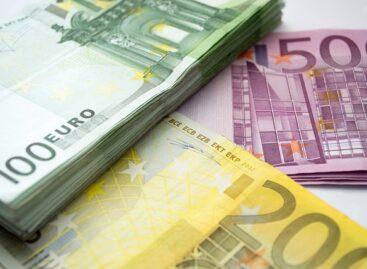Grüne Woche in Berlin – Prices are rising but where will they stop?
A political record: the agricultural ministers of 64 countries, including Hungary’s minister of rural development Sándor Fazekas, took part in the global food forum held at Grüne Woche in Berlin. At the end of the forum the ministers published a document in which they commit themselves to a new agricultural strategy. Within the framework of this new strategy politicians will try to create agricultures that do not harm the environment and make sustainable growth possible.
One of the most important goals is fighting famine and feeding more of the earth’s population. They also intend to support small farms in their investing in modern technology. At Grüne Woche 16 Hungarian small and medium-sized enterprises were exhibiting as part of the collective presence (on 270m²) organised by the Agricultural Marketing Centre, offering sausage, salami and pálinka. Wolfgang Rogall, deputy press spokesman of the fair told us that during the ten days they registered 420,000 visitors and realised a revenue of EUR 47 million. The average visitor spent EUR 111, mostly on food and drinks. There were 1,624 exhibitors from 56 countries and the 300 accompanying trade and political programmes attracted 105,000 participants. Approximately 5,000 journalists were accredited to the event and they reported to newspapers and magazines of five continents. At the opening press conference Jürgen Abraham, president of the Federation of German Food and Drink Industries pointed out that the price of base materials is soaring: the price of the thirteen most important food base materials increased by 13 percent on average last year, while oily seed and cereal prices surged by 41 percent; transportation and energy costs grew by 25 percent. Still, food prices only became 3 percent higher on average last year. As a matter of fact, Jürgen Abraham is better known in Hungary as a ham producer and exporter. He founded a company with his brother in 1964 and in 2010 their turnover was EUR 190 million. Two commissioners of the European Commission also gave press conferences: Dacian Ciolos, commissioner for agriculture and rural development introduced the EU’s plans for the period after 2013. John Dalli, commissioner for health and consumer policy spoke about the new European animal welfare policy. This year Romania was the special guest of Grüne Woche and agricultural minister Valeriu Tabara met with the press twice. He emphasised that 60 Romanian companies were present as exhibitors. The minister told that there is great potential in Romanian agriculture and by 2016 they would like to export more food products than they import.
Related news
Related news
MBH quick analysis: Tourism will continue to soar this year
🎧 Hallgasd a cikket: Lejátszás Szünet Folytatás Leállítás Nyelv: Auto…
Read more >A stable compass in the Hungarian FMCG sector for 20 years
🎧 Hallgasd a cikket: Lejátszás Szünet Folytatás Leállítás Nyelv: Auto…
Read more >Half of employees do not support salary transparency
🎧 Hallgasd a cikket: Lejátszás Szünet Folytatás Leállítás Nyelv: Auto…
Read more >






